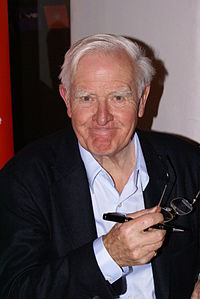John le Carre
| John le Carré | |
|---|---|

John le Carré in Hamburg, 2008
|
|
| Born | David John Moore Cornwell 19 October 1931 Poole, Dorset, England |
| Occupation | Novelist, former intelligence officer |
| Language | English |
| Nationality | British |
| Alma mater | Oxford University |
| Genre | Spy fiction |
| Notable works |
The Spy Who Came in from the Cold Tinker Tailor Soldier Spy The Honourable Schoolboy Smiley's People The Night Manager The Constant Gardener |
| Spouse | Alison Sharp (m. 1954–71) Valerie Eustace (m. 1972–present) |
| Children | 4 sons |
| Website | |
| johnlecarre |
|
David John Moore Cornwell, alias John le Carré /lə ˈkɑːrˌeɪ/, (born 19 October 1931) is a British author of espionage novels. During the 1950s and the 1960s, he worked for the Security Service and the Secret Intelligence Service, and began writing novels under his pen name. His third novel, The Spy Who Came in from the Cold (1963), became an international best-seller, and remains one of his best-known works. Following the success of this novel, he left MI6 to become a full-time author.
Le Carré established himself as a writer of espionage fiction. In 2008, The Times ranked him 22nd on its list of "The 50 greatest British writers since 1945". In 2011, he won the Goethe Medal, a yearly prize given by the Goethe Institute.
On 19 October 1931, David John Moore Cornwell was born to Ronald Thomas Archibald (Ronnie) Cornwell (1906–75) and Olive (Glassy) Cornwell, in Poole, Dorset, England. He was the second son to the marriage, the first being Tony, two years his elder, now a retired advertising executive. His younger half-sister is the actress Charlotte Cornwell. Rupert Cornwell, a former The Independent newspaper Washington bureau-chief, is a younger half-brother. Le Carré said he did not know his mother, who abandoned him when he was five years old, until their re-acquaintance when he was 21 years old. His relationship with his father was difficult – given that the man had been jailed for insurance fraud, was an associate of the Kray twins (among the foremost criminals in London) and was continually in debt. A biographer reports,
...
Wikipedia
